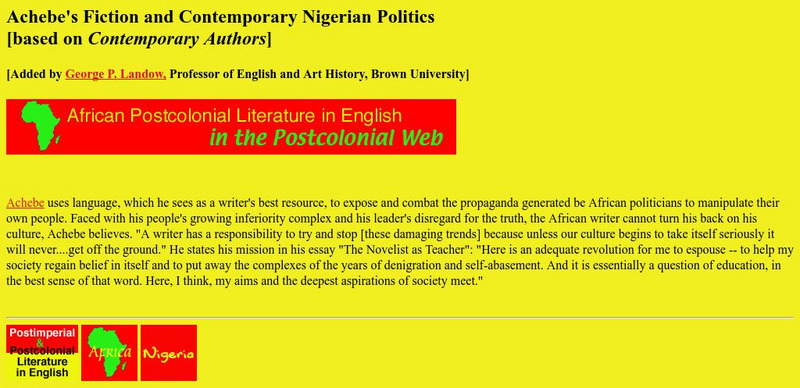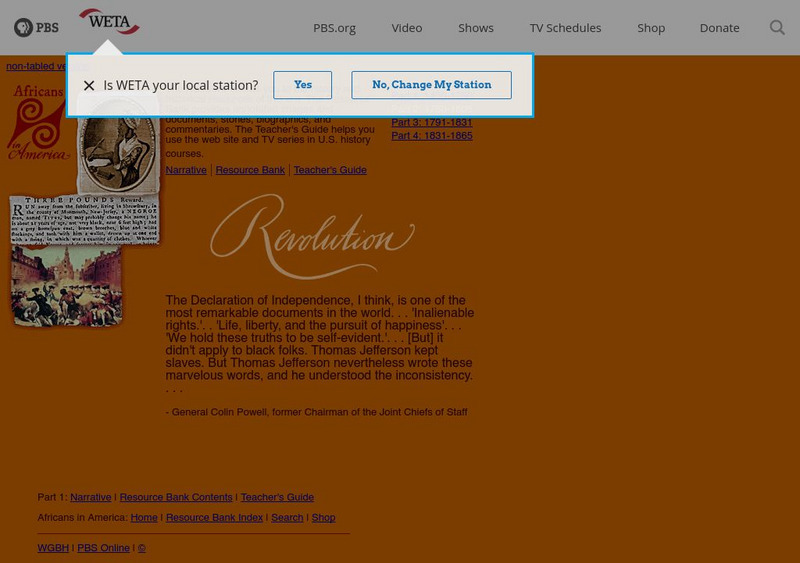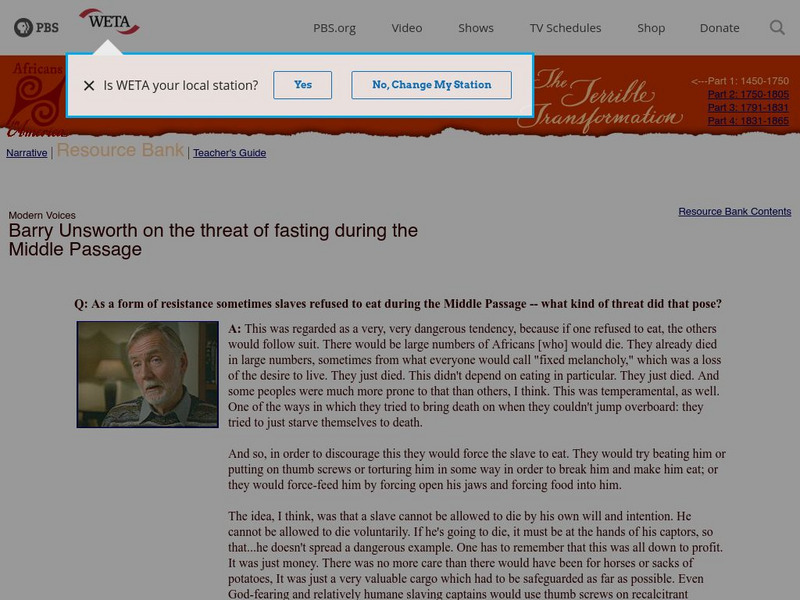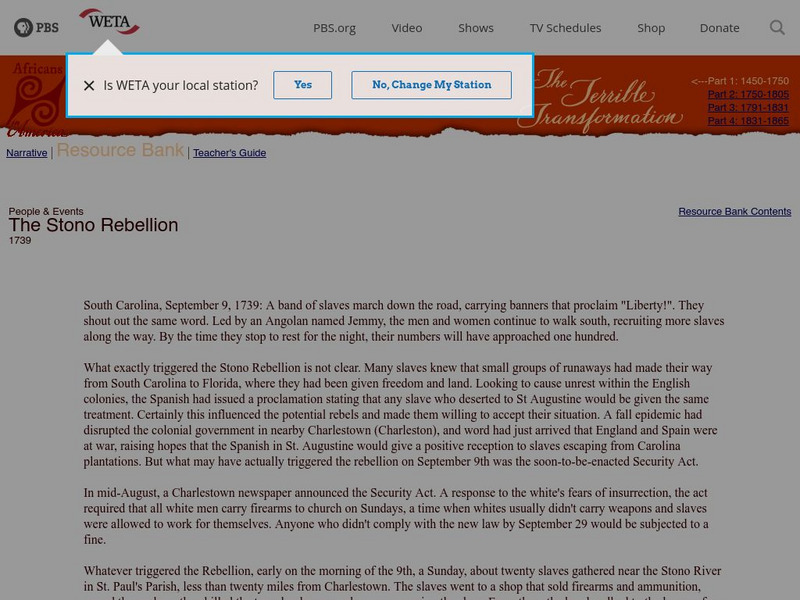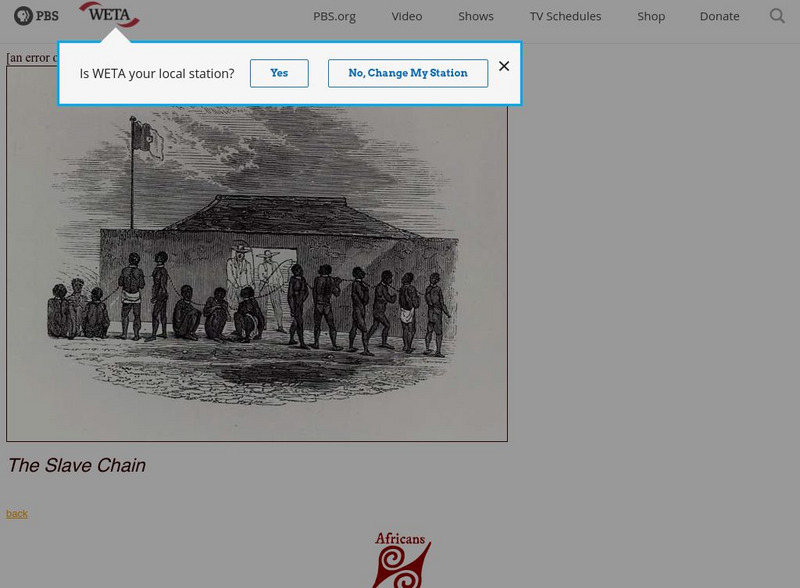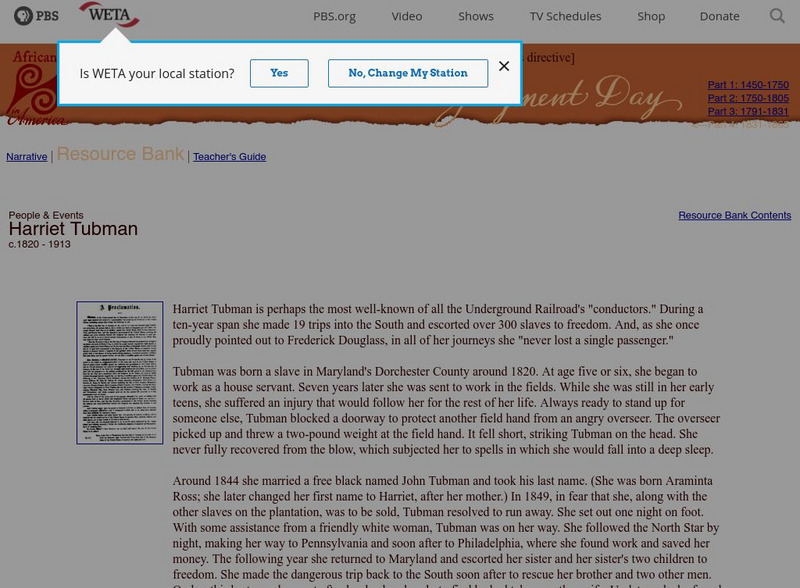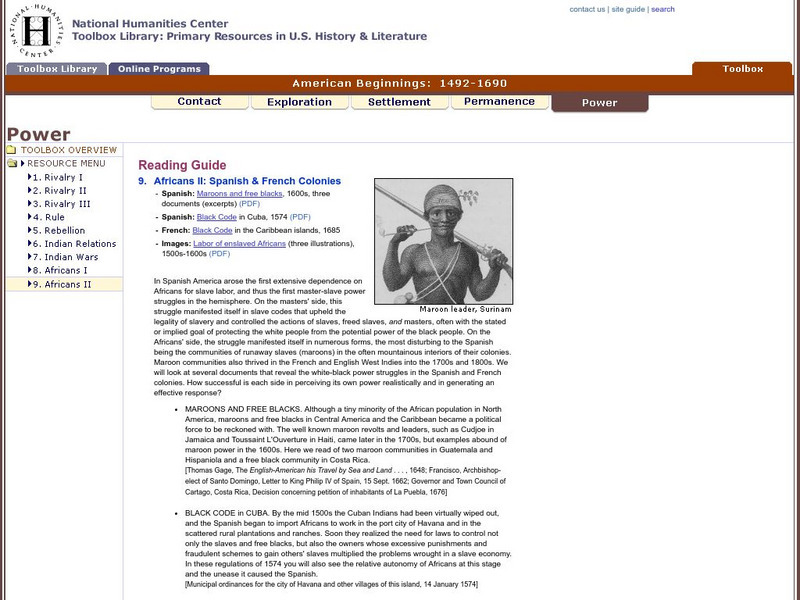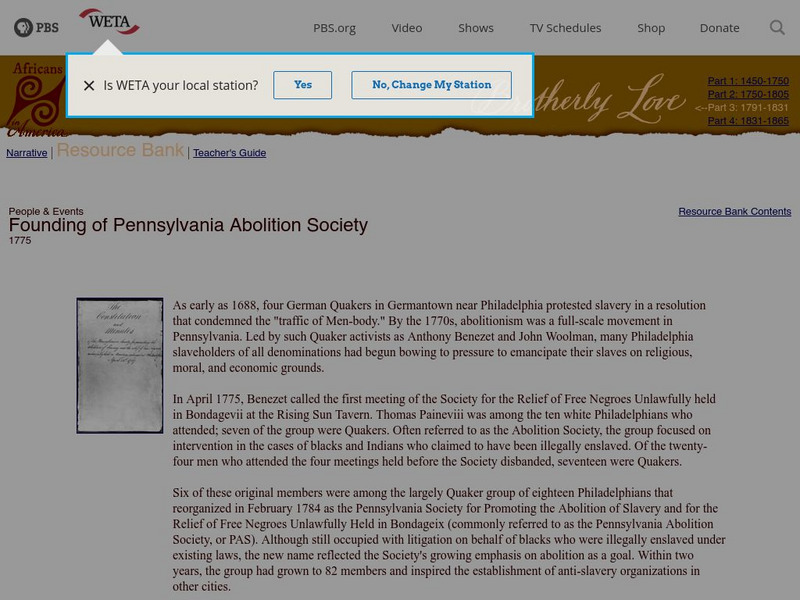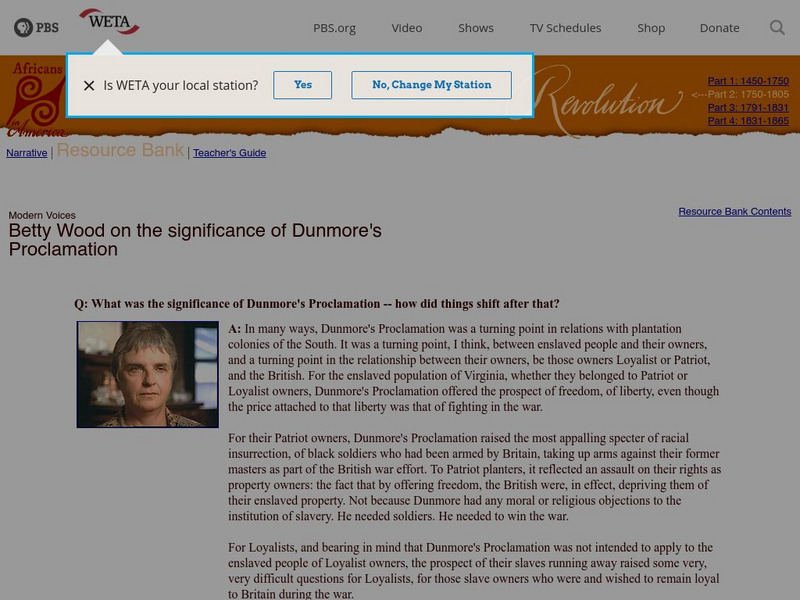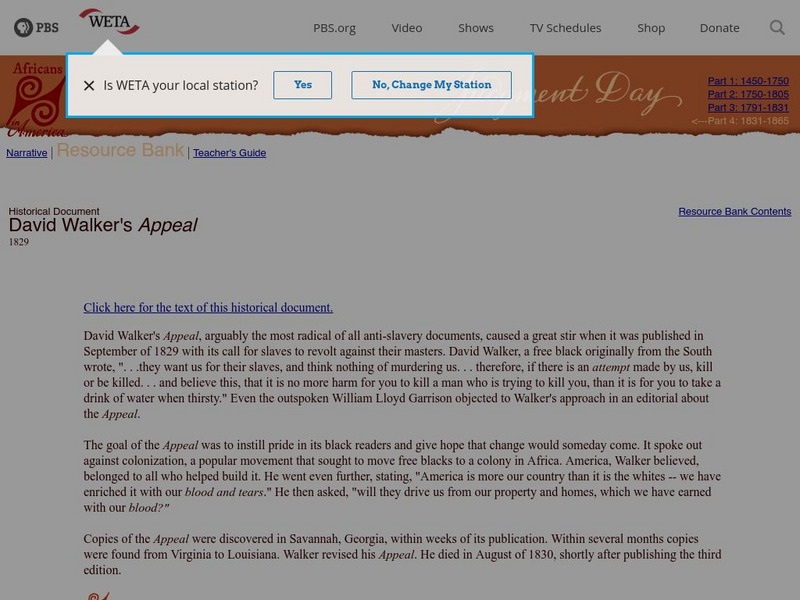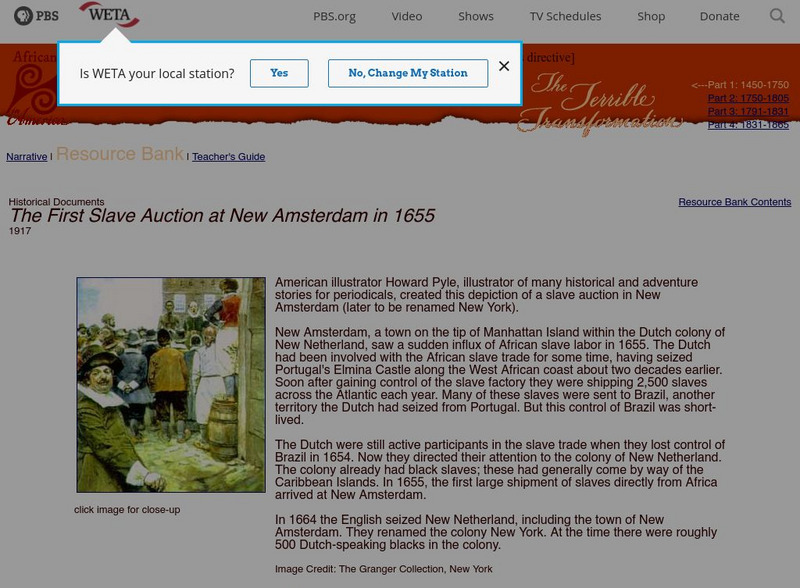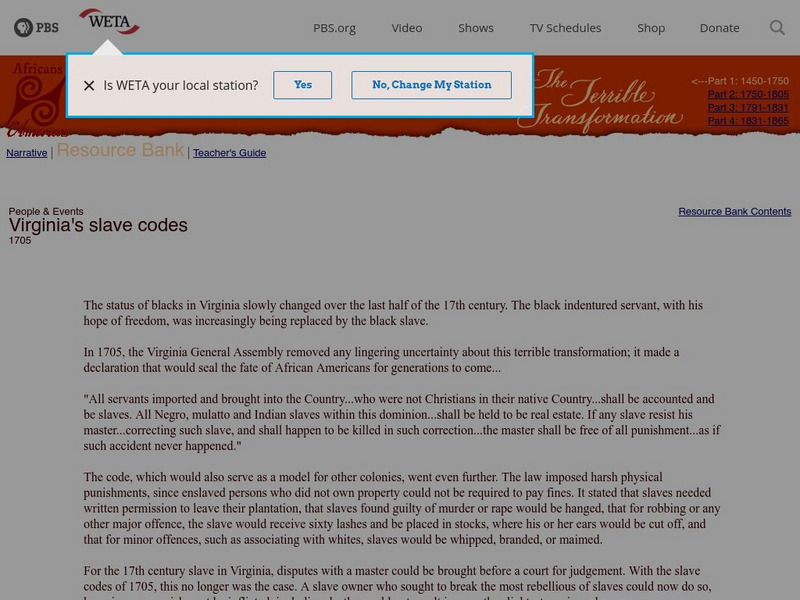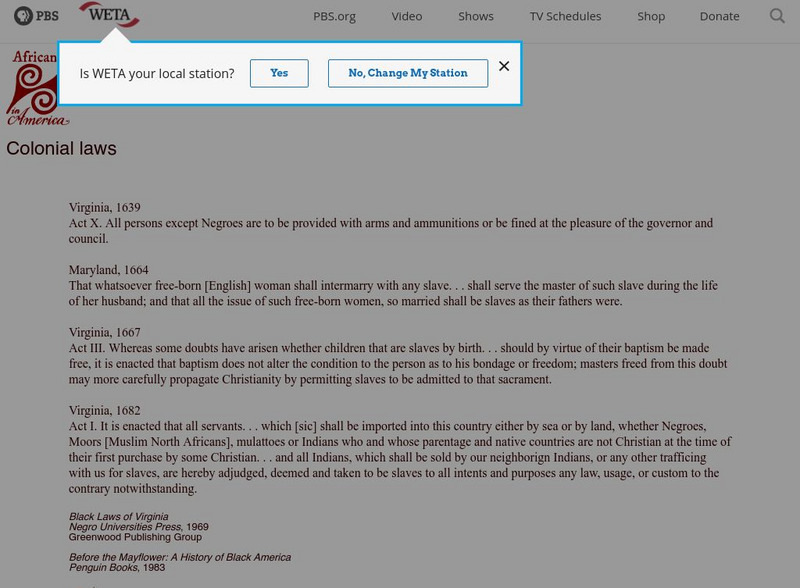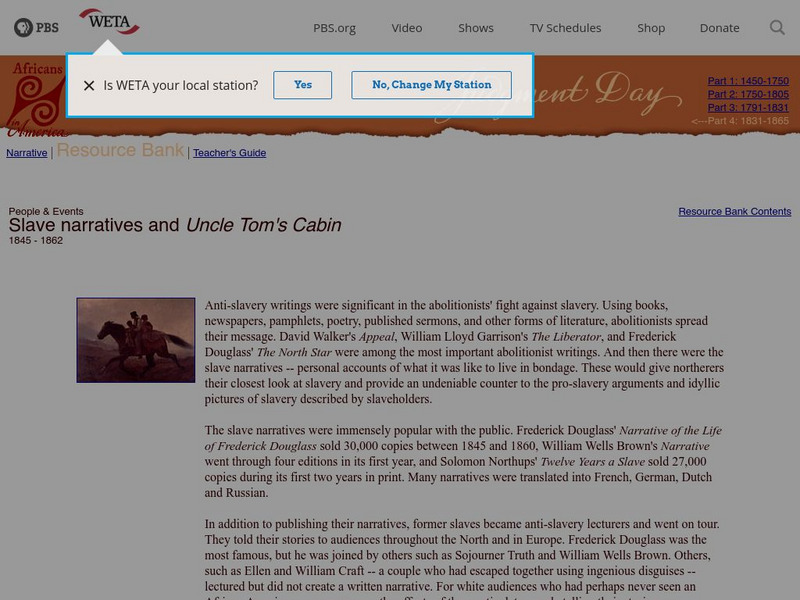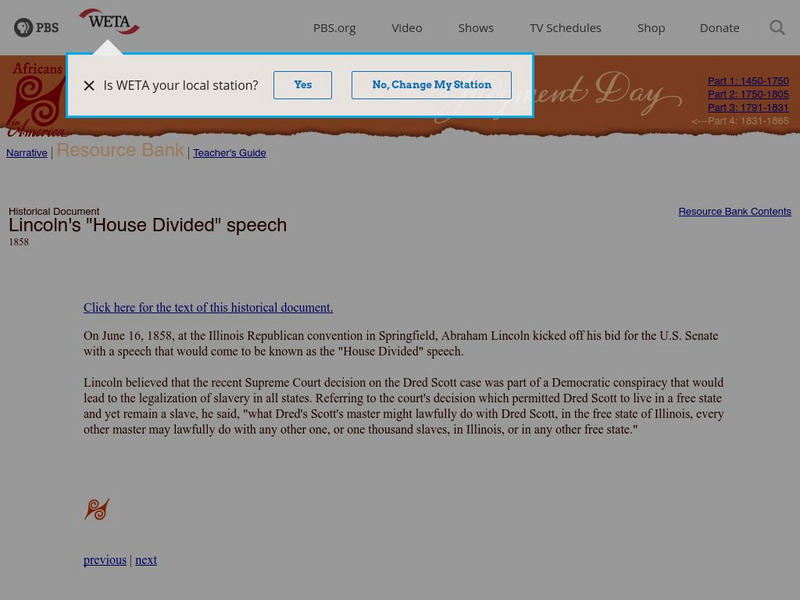Colonial Williamsburg Foundation
Colonial Williamsburg: The Two Williamsburgs
This lesson plan on daily life in Colonial Williamsburg challenges students to compare and contrast the lives of the African and European populations.
Columbia University
Columbia University: The Unfinished Dialogue of m.l. King, Jr. & Malcolm X [Pdf]
A scholarly article examining the issue of whether Malcolm X and Dr. King could have ever reconciled their different visions of Black America.
Other
African Postcolonial Literature in English: Achebe's Fiction
A short synopsis on Achebe's use of language to combat politics in Africa. With a quote from his essay "The Novelist as Teacher."
PBS
Pbs Africans in America: "The Bloody Massacre"
From the PBS series "Africans in America," this site explores Paul Revere's engraving of the Boston Massacre. The article discusses its use as propaganda, as well as what the engraving actually depicts.
Gilder Lehrman Institute of American History
Gilder Lehrman Institute: Post Civil War America
[Free Registration/Login Required] "A variety of materials demonstrates the rise and fall of civil rights for African Americans during the latter half of the nineteenth century, including constitutional amendments, sharecropper...
PBS
Africans in America: Revolution: 1750 1805
Part of a detailed PBS site which describes "the history of racial slavery in the United States, this section focuses on slavery from 1750-1805.
PBS
Africans in America: Revolution: Agrippa Hull, 1759 1838
A brief look at Agrippa Hull, a free black who served as an orderly to officers in the Continental Army. From PBS.
PBS
Pbs: Cet: Africans in America: The Underground Railroad
This PBS site provides a general history of the Underground Railroad, including a focus on notable participants or "conductors." Click on Teacher's Guide for teacher resources.
PBS
Pbs: Cet: Africans in America: The Threat of Fasting During the Middle Passage
Description of how slaves tried to starve themselves to death on slave ships as a form of resistance, and how the slave traders forced them to eat so they would not lose money. Click on Teacher's Guide for teaching resources.
PBS
Pbs: Cet: Africans in America: The Stono Rebellion
The Stono Rebellion and its impact is described in this informative essay. Hyperlinks to more discussion of this event. Teacher's Guide offers teacher resources.
PBS
Pbs: Africans in America: The Slave Chain
A close up picture providing an example of what a slave chain looks like. Click on Teacher's Guide for teacher resources.
PBS
Pbs: Africans in America: Harriet Tubman (1820 1913)
Here is a brief article from PBS on the life and accomplishments of abolitionist Harriet Tubman, who risked her life on several occasions to ensure the freedom of others. Links to a teacher's guide and primary sources are provided.
National Humanities Center
National Humanities Center: Toolbox Library: Africans Ii, American Beginnings: 1492 1690
Three illustrations and five documents about slave codes, master-slave power dynamics, and free blacks within French and Spanish settlements of the Caribbean.
PBS
Africans in America: Founding of the Pennsylvania Abolition Society
A detailed account of the founding of the first Quaker abolitionist society in 1775 in Philadelphia by Anthony Benezet. The society became known as "PAS" or "Pennsylvania Abolition Society".
PBS
Africans in America: Revolution: Significance of Dunmore's Proclamation
A brief interview with Betty Wood, professor of history, on the significance of Dunmore's Proclamation to Loyalist plantation owners, Patriot plantation owners, and, in particular, the slaves themselves. From PBS.
PBS
Pbs's Africans in America: Equiano's Autobiography
Chapter two of "The Interesting Narrative of the Life of Olaudah Equiano," the autobiography of a man abducted from Africa and forced into slavery before later obtaining his freedom. This chapter details his capture and eventual journey...
PBS
Pbs: Cet: Africans in America: David Walker's Appeal
A description of the impact of David Walker's "Appeal" calling for slaves to revolt. Click on the link to read the original text. Click on Teachers Guide for teaching resources
PBS
Pbs: Africans in America: David Walker (1796 1830)
At this site from PBS you can read about the life of David Walker. Born in the late 18th century as a free black, he was most known for his pamplet, entitled "Appeal," which advocated slave revolt.
PBS
Pbs: Cet: Africans in America: The First Slave Auction at New Amsterdam in 1655
This website contains a general description of the time and reason for the first large slave auction held in the Dutch colony of New Amsterdam. Click on Teacher's Guide for teaching resources.
PBS
Africans in America: Virginia's Slave Codes (1705)
This website describes contents of the Virginia Slave Codes of 1705 with excerpts from the orginal law.
PBS
Africans in America: Colonial Laws
Read some excerpts from original colonial laws concerning slaves.
National Humanities Center
National Humanities Center: Toolbox Library: Slave, Making of African American Identity: V. 1
This resource provides nineteenth-century black narratives that address what it meant to be enslaved and how slaves' identity was formed and changed over time.
PBS
Africans in America: Slave Narratives and Uncle Tom's Cabin
Slave narratives were an effective tool to spread information about what slavery was really like. Perhaps the most widely read literature about slavery happened to be written by a white woman, Harriet Beecher Stowe. Read about the impact...
PBS
Pbs: Cet: Africans in America: Lincoln's "House Divided" Speech
Short history and text of Abraham Lincoln's "House Divided" speech given in 1858. Click on the link to see the text of the speech. Click on Teacher's Guide for teaching resources.



![Columbia University: The Unfinished Dialogue of m.l. King, Jr. & Malcolm X [Pdf] Handout Columbia University: The Unfinished Dialogue of m.l. King, Jr. & Malcolm X [Pdf] Handout](https://d15y2dacu3jp90.cloudfront.net/images/attachment_defaults/resource/large/FPO-knovation.png)
